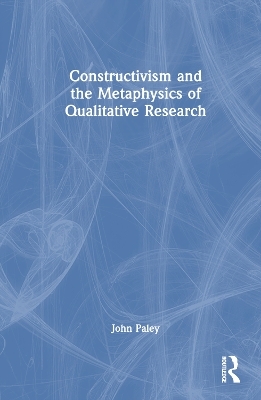
Constructivism and the Metaphysics of Qualitative Research
Seiten
2024
Routledge (Verlag)
978-1-032-30717-6 (ISBN)
Routledge (Verlag)
978-1-032-30717-6 (ISBN)
This book re-examines the philosophically-based, ontological and epistemological foundations that underlie all qualitative research principles.
This book challenges the widespread assumption that a necessary preliminary to qualitative research is the formulation of ontological and epistemological beliefs. It argues that the metaphysical claims which supposedly underpin different approaches to social research do not make sense. Literally. Sentences such as ‘There is a single objective reality’ and ‘There are multiple constructed realities’ fail to make information-providing statements. They do not refer or describe. Despite appearances, they say nothing about reality (or realities) at a fundamental level, so they cannot be used to justify, ground, or align with, methodological decisions. The ‘necessary preliminary’ turns out not to be necessary at all; and we can dispense with, not just ‘paradigms’, but metaphysical underpinnings in general, whether structured as paradigms or not.
Drawing on Wittgenstein’s later philosophy, Carnap’s metametaphysics, and contemporary linguistics, the book suggests that the metaphysical claims of qualitative texts can be reinterpreted as performative. Ontological and epistemological beliefs are resolutions and proposals, recommendations for the use of language. They form part of a creed by means of which researchers enact the joining of an academic community. Written in Paley’s trademark clear, accessible and conversational style, the book points to a revolution in our understanding of the relation between metaphysics and social research. It will be essential reading for anyone interested in qualitative research and its philosophical foundations.
This book challenges the widespread assumption that a necessary preliminary to qualitative research is the formulation of ontological and epistemological beliefs. It argues that the metaphysical claims which supposedly underpin different approaches to social research do not make sense. Literally. Sentences such as ‘There is a single objective reality’ and ‘There are multiple constructed realities’ fail to make information-providing statements. They do not refer or describe. Despite appearances, they say nothing about reality (or realities) at a fundamental level, so they cannot be used to justify, ground, or align with, methodological decisions. The ‘necessary preliminary’ turns out not to be necessary at all; and we can dispense with, not just ‘paradigms’, but metaphysical underpinnings in general, whether structured as paradigms or not.
Drawing on Wittgenstein’s later philosophy, Carnap’s metametaphysics, and contemporary linguistics, the book suggests that the metaphysical claims of qualitative texts can be reinterpreted as performative. Ontological and epistemological beliefs are resolutions and proposals, recommendations for the use of language. They form part of a creed by means of which researchers enact the joining of an academic community. Written in Paley’s trademark clear, accessible and conversational style, the book points to a revolution in our understanding of the relation between metaphysics and social research. It will be essential reading for anyone interested in qualitative research and its philosophical foundations.
John Paley was formerly senior lecturer at the University of Stirling and is currently Honorary Fellow at the University of Worcester. He is the author of two previous books for Routledge: Phenomenology as Qualitative Research: A Critical Analysis of Meaning Attribution and Concept Analysis in Nursing: A New Approach.
1. Introduction: Terms and Conditions Apply; Part I: The Key Players 2. Lincoln and Guba’s Paradigms 3. Wittgenstein’s Metaphilosophy 4. Carnap’s Metametaphysics; Part II: The Key Concepts 5. ‘There Is’, ‘There Exist’ 6. ‘Single Reality’, ‘Multiple Realities’ 7. ‘Constructed’, ‘Socially Constructed’ 8. ‘The Knower’ and ‘The Known’ 9. ‘Objective’ 10. ‘Cause’ and Causal Language 11. ‘True’ and ‘Truth’ 12. ‘Experience’; Epilogue
| Erscheinungsdatum | 23.08.2024 |
|---|---|
| Zusatzinfo | 1 Line drawings, black and white; 1 Halftones, black and white; 2 Illustrations, black and white |
| Verlagsort | London |
| Sprache | englisch |
| Maße | 156 x 234 mm |
| Gewicht | 748 g |
| Themenwelt | Geisteswissenschaften ► Philosophie ► Metaphysik / Ontologie |
| Geisteswissenschaften ► Philosophie ► Philosophie der Neuzeit | |
| Medizin / Pharmazie ► Pflege | |
| Sozialwissenschaften ► Pädagogik ► Erwachsenenbildung | |
| ISBN-10 | 1-032-30717-X / 103230717X |
| ISBN-13 | 978-1-032-30717-6 / 9781032307176 |
| Zustand | Neuware |
| Haben Sie eine Frage zum Produkt? |
Mehr entdecken
aus dem Bereich
aus dem Bereich
Buch | Hardcover (2024)
Matthes & Seitz (Verlag)
CHF 41,90
Über konstruktivistisches Denken in der Theologie
Buch | Softcover (2024)
Verlag Herder
CHF 79,95


